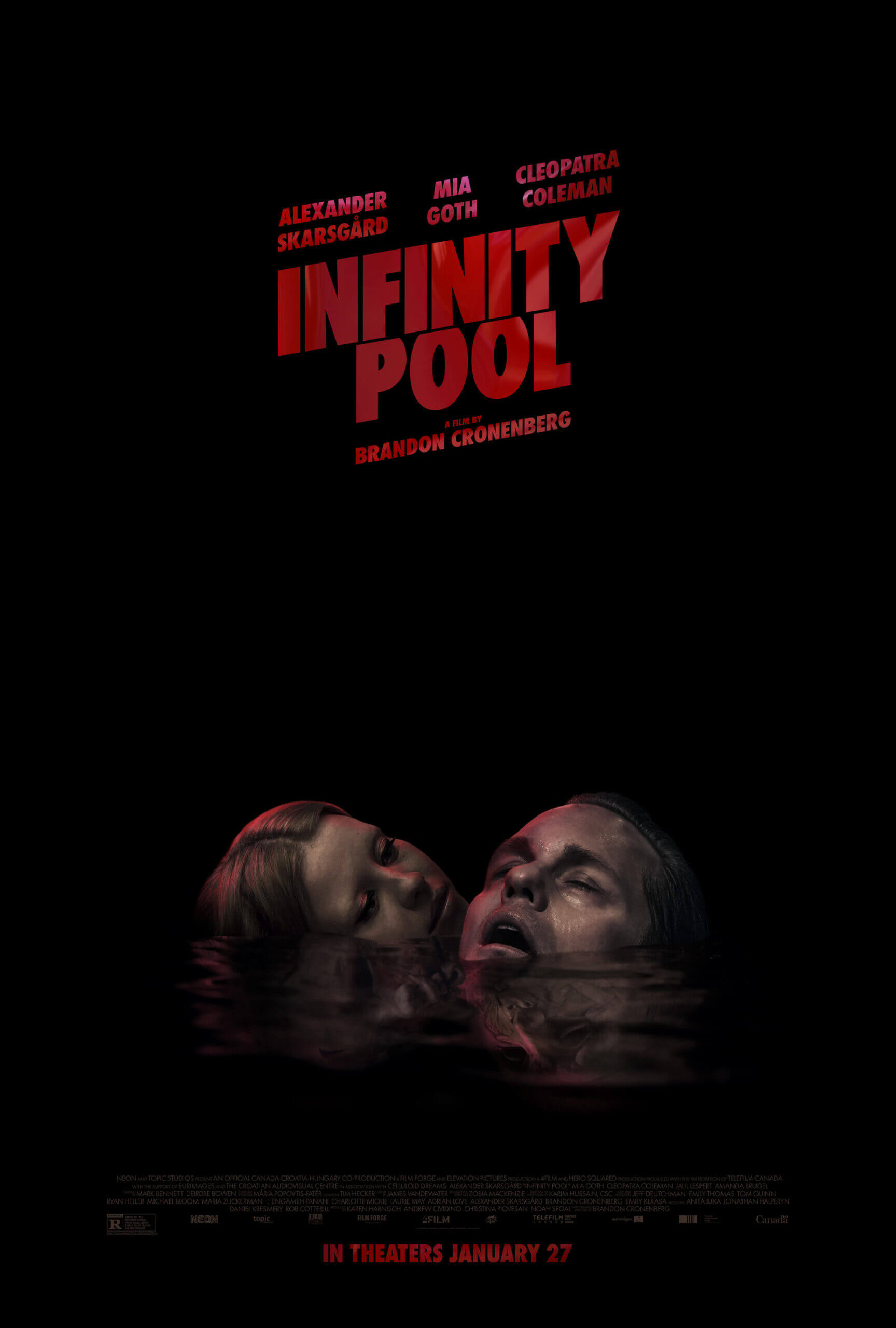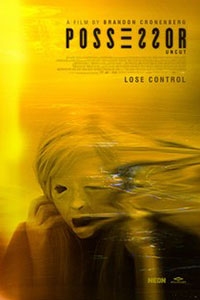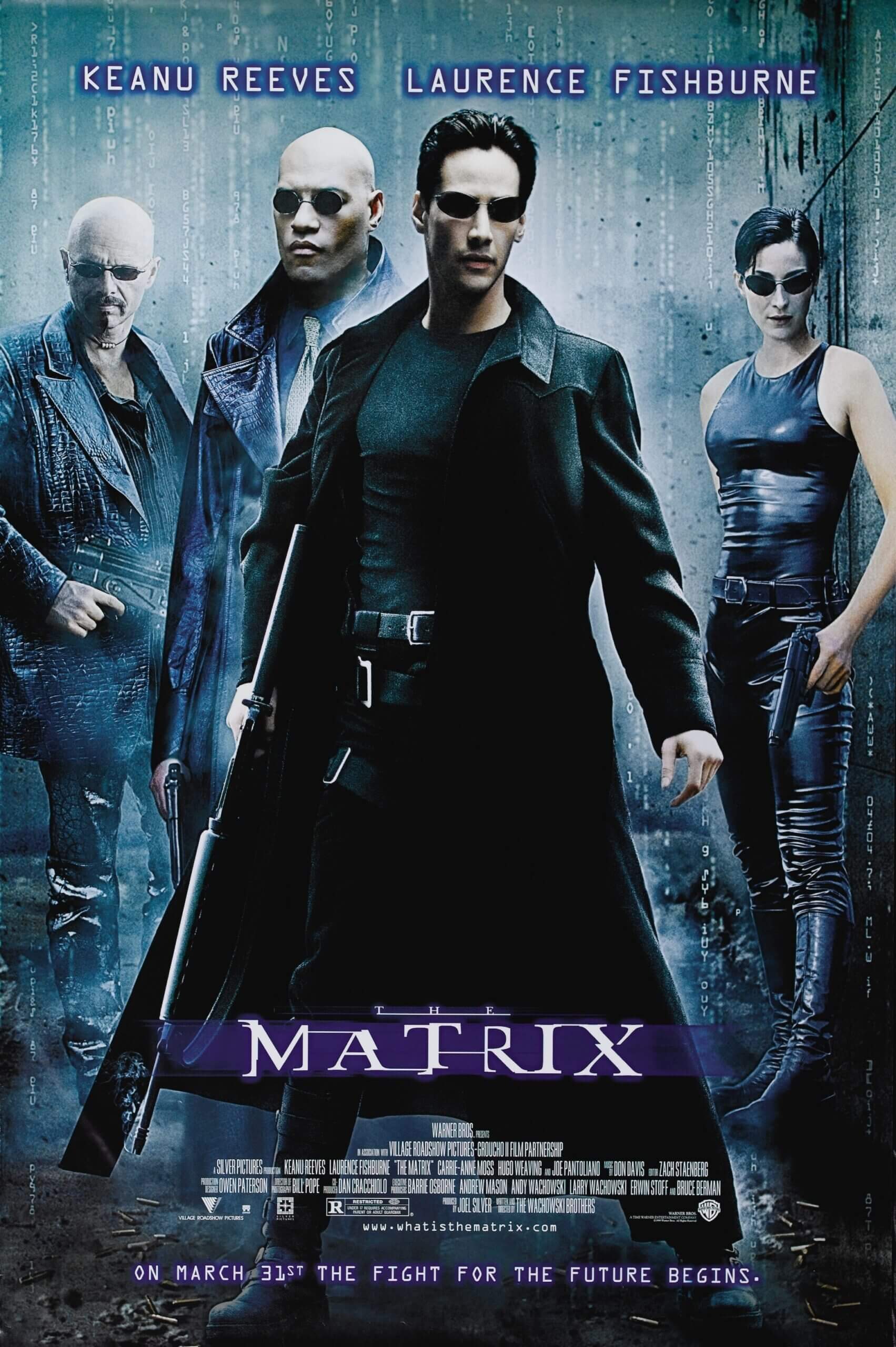
Infinity Pool
By Brian Eggert |
Brandon Cronenberg critiques Western hedonism in his third and best feature so far, Infinity Pool. Vacationers in a fictional impoverished country, Li Tolqa, find that a legal exception for tourists allows them to get away with any crime imaginable. But, as those familiar with the writer-director’s two earlier titles, Antiviral (2012) and Possessor (2020), can no doubt imagine, Cronenberg explores this idea with twisted, grotesque imagery and mind-bending psychological implications. After all, his name is Cronenberg, and the director shares more than a few thematic preoccupations with his father, David, the Canadian helmer of The Fly (1986) and A History of Violence (2005). Somewhere between the doppelgängers, psychedelic orgies, various bodily fluids, and morbidly maternal nipple-sucking, the younger Cronenberg manages to outdo himself, which is no small feat. But it’s not without some caustic remarks about the base, lizard-brained desires of human beings that Infinity Pool conjures memorable performances and abject weirdness.
The story plays out like a demented version of last year’s The Forgiven, John Michael McDonagh’s meditative look at the “useless people” who travel to other countries and exploit locals with their wealth and privilege in hopes of finding themselves. Later, the proceedings resemble the undercooked Arnold Schwarzenegger clone actioner The 6th Day (2000), with a smattering of Brian Yuzna’s gloopy gorefest Society (1989). In a spirited performance, Alexander Skarsgård plays struggling novelist James Foster, who hopes to find inspiration in Li Tolqa, a nondescript foreign land with a gated resort that guests—mostly Westerners—are forbidden to leave, hence the armed guards and barbed wire fences. His wife, Em (Cleopatra Coleman), whose wealthy publisher father helped James get his first and only book into print, paid for the trip. Though, she’s not having fun catering to James’ writer’s block and humiliates him whenever possible, showing no interest in local customs—such as “the summoning,” a ritual involving messed-up masks straight out of a nightmare.
Given his un-nurturing company, James finds himself drawn to Gabi (Mia Goth), an admiring fan who invites the couple to dinner with her architect husband Alban (Jalil Lespert). The next day, the two couples defy the resort’s policy and sneak away for a scenic drive and beachside barbeque, where James steps away to urinate and then finds himself in Gabi’s hands. On the way back, everyone’s a little drunk, yet James agrees to drive and hits a local farmer walking on the road at night. Although everyone’s panicked, Gabi warns that the “uncivilized” local police will rape and murder outsiders, so they avoid telling anyone and return to the resort. But between James’ juicy encounter with Gabi and the gruesome image of a dead pedestrian, Cronenberg is just getting started. James is soon arrested, and an official (Thomas Kretschmann) tells him that in Li Tolqan law, the victim’s “eldest son should kill you to preserve the family’s honor.” So as not to dissuade tourism given their strict laws, the authorities offer rich criminals the option of paying a hefty sum to create an identical clone, complete with memories, who will endure the death penalty as the original watches.
 The intriguing concept of Infinity Pool leads to psychological questions and warped possibilities. James walks away from the jarring but oddly fascinating experience of seeing his doppelgänger executed—by a preadolescent child, no less—and receives the ashes of his double in an urn. Smartly, Em wants to leave the country, and now. James remains behind, claiming he can’t find his passport, only to find himself part of an exclusive club of self-described “zombies” who have each had their clones executed before. Gabi and Alban are members, and along with several others, they enjoy indulging their innermost desires and watching their clones bear the punishment again and again. However, given that the clone has the original’s memories, how does James know that he’s not the clone? What does it say about you that you want to see yourself repeatedly executed? What are your limits when there’s nothing to stop you from acting on every impulse, aside from the cost of another double? The club helps James explore these questions with local mind-altering substances and a shared embrace of debauched and murderous behaviors.
The intriguing concept of Infinity Pool leads to psychological questions and warped possibilities. James walks away from the jarring but oddly fascinating experience of seeing his doppelgänger executed—by a preadolescent child, no less—and receives the ashes of his double in an urn. Smartly, Em wants to leave the country, and now. James remains behind, claiming he can’t find his passport, only to find himself part of an exclusive club of self-described “zombies” who have each had their clones executed before. Gabi and Alban are members, and along with several others, they enjoy indulging their innermost desires and watching their clones bear the punishment again and again. However, given that the clone has the original’s memories, how does James know that he’s not the clone? What does it say about you that you want to see yourself repeatedly executed? What are your limits when there’s nothing to stop you from acting on every impulse, aside from the cost of another double? The club helps James explore these questions with local mind-altering substances and a shared embrace of debauched and murderous behaviors.
Croatia supplies the real-life Li Tolqan resort and exteriors, and a distinct three-island view from the shorelines (but as far as I know, Croatia can’t clone people). It’s an otherworldly locale, and Cronenberg adds to the sense of disorientation with the Li Tolqan language, resembling the brain-scrambled look of written language in a dream. To be sure, much of Infinity Pool from this point forward feels like a state of unconsciousness (“Is this a dream?” Em asks. “It would make more sense.”). On the other hand, maybe it is a dream, or a very bad trip. Once James indulges in an aphrodisiacal hallucinogen, editor James Vandewater splices together a series of hued and fractured images of the ensuing orgy, which goes on forever, where flesh seems to melt and contort, and body parts mutate in freaky ways. Tim Hecker’s score, full of droning notes, heavy guitar strums, and thumping percussion, plays less like music and more like sound design at times. Director of photography Karim Hussain, Cronenberg’s collaborator since Antiviral, shoots in an array of close-ups, often segmenting faces to a particular feature, such as a mouth or eyes.
As intimate as Cronenberg’s frame gets, his actors do the work of making Infinity Pool more than a procession of fucked up sights that cause the audience to squirm. While accomplished, the director’s last two films kept me at a remove, given the lack of relatable personalities or motivations onscreen. His earlier characters tend to be ciphers that propel his high-concept ideas and uncanny visuals. But Skarsgård commits to his character, indulging in his insecurities and unleashing his animalistic side, while James’ reasons remain clear throughout. Goth, fresh off the one-two punch of Ti West’s X and Pearl last year, gives another wholly uninhibited performance. Although she presents as a honeypot, a monstrous personality emerges later in the proceedings when Gabi and company reveal their insidious, power-obsessed goal to humiliate James—the worst part for him being, hilariously, that Gabi never read his book. Goth is an unbridled demon at times, using the shrieking sound of her mocking voice to jarring effect, while also proving she’s one of today’s most exciting performers.
By the end, James finds himself reborn, prompting an unintentionally comical scene of rebirth, with him suckling at the teat of his new self’s mother—an image that might prompt you to decide that you’ve had enough of these shenanigans. Though it’s a moment worthy of an eye roll or guffaw, Cronenberg follows it with his most unsettling statement: Infinity Pool shakes James to his core through depraved experiences, but more haunting is James’ sober realization that any one of us is capable of awful behavior and deviant impulses (especially if you’re rich and can afford the consequences). Looking at the world today, it’s evident that Cronenberg’s out-there premise serves to reveal humanity’s corrupted nature. Whereas Cronenberg’s earlier films showed a talented filmmaker exploring ideas with a cold, intellectual distance, his latest reveals that he’s evolving into a director interested in more than bizarre and horrifying scenarios—he has the capacity to write compelling characters and enable his actors to make wild choices. Disturbing and surreal as it is, the film is a memorable experience from a distinct voice.

Thank You for Supporting Independent Film Criticism
If the work on DFR has added something meaningful to your love of movies, please consider supporting it.
Here are a few ways to show your support: make a one-time donation, join DFR’s Patreon for access to exclusive writing, or show your support in other ways.
Your contribution helps keep this site running independently. However you choose to support the site, please know that it’s appreciated.
Thank you for reading, and for making this work possible.
Brian Eggert | Critic, Founder
Deep Focus Review







